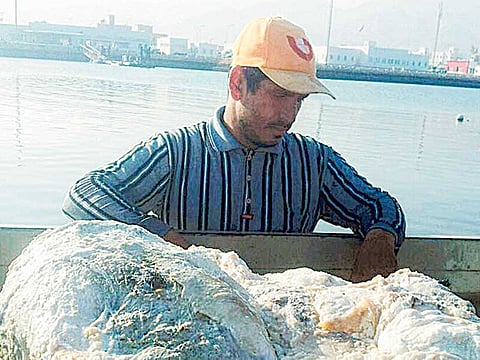Omani fisherman becomes millionaire after rare find
An Omani fisherman has hit the jackpot after he found a floating wax-like substance

Muscat: An Omani fisherman has hit the jackpot after he found floating “whale vomit” on the shores of Qurayat province on October 30 worth one million Omani riyals (Dh9.5 million).
Ambergris is a wax-like soft substance secreted from the intestines of the sperm whale, which is how it got its name “whale vomit”.
The substance is often found floating in tropical seas and used in perfume manufacturing.
Khalid Al Sinani, who is in his late 30s, worked long and tiring days as a fisherman to put food on the table for his family.
He was on his way back home when he smelt a “horrible smell from a distance”. He used ropes to gather the vomit, which weighed more than 60 kilograms and lift it into his 20 foot boat.
“My dream came true. I have been waiting for such a moment for the past 20 years when I started fishing with my father,” Al Sinani told Shabiba, a local newspaper.
Traders from the UAE and Saudi Arabia offered Al Sinani more than 10,000 riyals for per kg but he refused, waiting for more decent offers.
Al Sinai wants at least 18,000 riyals for per kg.
After he gets paid, Al Sinani said he wants to change professions and work in the real estate sector.
In November 2015, two Omanis found the prized substance in the guts of a dead sperm whale that had washed up on the Fooshi shores of Saadah province in southern Oman.
They sold it for more than 80,000 riyals to a local trader.
Ambergris is used for making high-end perfumes whose costs run into the thousands of dollars. The word ‘ambergris’ comes from the Arabic word ‘anbar’.
Amouage, one of international luxury perfume brands from Oman, uses ambergris to make its perfumes, which are some of the most expensive in the world.
Oman is famous for having ambergris wash up on its shores particularly in Sharqiyah, Wusta and Dhofar governorates.
Ambergris used to be highly valued by perfumers as a fixative (allowing the scent to last much longer), but some perfumers have resorted to using the synthetic ambroxan.
It is formed in the intestines of the sperm whale in response to irritation caused to the stomach lining of the whale from the sharp, indigestible, beaks of squid, which is a staple part of the sperm whale diet.
It initially produces a faecal odour, but with time, its odour changes to sweet and earthy.
Sign up for the Daily Briefing
Get the latest news and updates straight to your inbox



